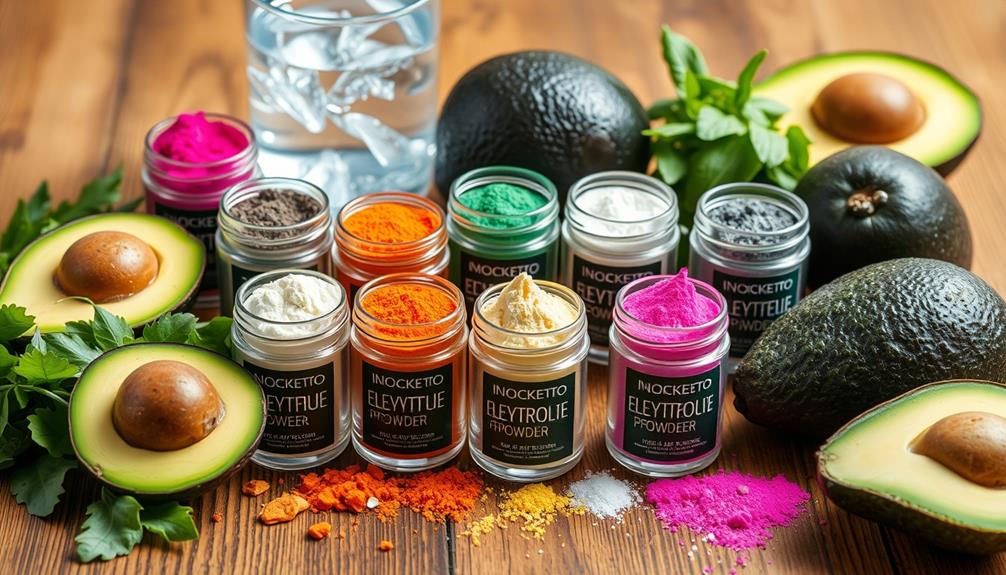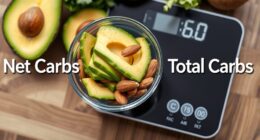To thrive on a keto diet, you should consider key supplements. Start with MCT oil, which boosts ketone production—begin with 1 teaspoon. Magnesium is essential, so aim for 200-400 mg daily. Don't forget electrolytes; target 3-5 grams of sodium and 4.7 grams of potassium to fend off "keto flu." Omega-3 fatty acids are beneficial too; shoot for at least 500 mg of EPA and DHA daily for inflammation support. Finally, Vitamin D (1500-2000 IU) can enhance bone health. There's more to explore about how these supplements can support your keto journey, so keep going!
Key Takeaways
- MCT oil rapidly increases ketone levels; start with 1 teaspoon and gradually increase for energy support.
- Magnesium supplementation (200-400 mg daily) helps alleviate muscle cramps and supports numerous bodily functions.
- Electrolyte supplements are crucial to combat "keto flu"; aim for 3-5 grams sodium and 4.7 grams potassium daily.
- Omega-3 fatty acids provide anti-inflammatory benefits; target at least 500 mg EPA and DHA daily for heart health.
- Vitamin D is essential for immune function and calcium absorption; consider 1500-2000 IU daily, especially in low-sunlight areas.
Importance of Keto Supplements

While commencing on a ketogenic diet can lead to impressive weight loss and improved energy levels, it often restricts the variety of foods you consume, which can create nutritional gaps. This is where keto supplements come into play, bridging those gaps and helping you maintain ideal health.
Magnesium is essential, with a recommended intake of 200-400 mg daily, as it supports over 300 bodily processes and can also alleviate symptoms of the "keto flu," like muscle cramps and sleep disturbances.
Electrolyte supplementation is vital during your initial keto shift; low insulin levels can lead to increased sodium and potassium loss, so aim for 3-5 grams of sodium and 4.7 grams of potassium each day.
MCT oil is another valuable supplement, starting at 1 teaspoon and increasing gradually. It provides a quick energy source and boosts ketone production, aiding in weight management and athletic performance.
Finally, don't forget omega-3 fatty acids—target at least 500 mg of EPA and DHA daily to reap their anti-inflammatory benefits and support overall health while on your ketogenic diet.
Essential Nutrients to Consider

When starting on a ketogenic diet, it's essential to pay attention to important nutrients that can support your health and well-being. One key nutrient is magnesium, which plays a role in over 300 bodily processes. Aim for a daily intake of 200-400 mg to help with muscle cramps and sleep issues.
Don't forget about electrolytes; sodium, potassium, and magnesium are significant during the initial keto changeover. Recommended intakes include 3-5 grams of sodium and 4.7 grams of potassium.
Omega-3 fatty acids are also important, as they help reduce inflammation and support heart health. Aim for at least 500 mg of EPA and DHA per serving.
Vitamin D is essential for calcium absorption and immune function, especially if you live in low-sunlight areas; consider a daily dose of 1500-2000 IU.
Top Recommended Supplements

To maximize your success on a ketogenic diet, incorporating the right supplements can make a notable difference.
Start with MCT Oil, as it rapidly increases ketone levels, providing quick energy. A good starting dose is 1 teaspoon to minimize any gastrointestinal discomfort.
Next, consider adding Magnesium; it supports over 300 bodily functions and can help alleviate muscle cramps and sleep issues often encountered on keto. Aim for a daily intake of 200-400 mg.
Electrolyte supplements are essential during your shift to the ketogenic diet to combat the "keto flu." Aim for daily intakes of 3-5 grams of sodium, 4.7 grams of potassium, and 300-500 mg of magnesium.
Don't overlook Omega-3 fatty acids, which offer anti-inflammatory benefits and support heart health. Aiming for at least 500 mg of EPA and DHA daily is recommended.
Lastly, Vitamin D supplementation is vital, especially in low-sunlight regions. A daily dose of 1500-2000 IU can help prevent deficiencies that affect your bone health and overall well-being.
These supplements for keto can greatly enhance your experience and results on the diet.
Managing Side Effects

Adjusting to a ketogenic diet can sometimes feel like a bumpy road, especially with the onset of the "keto flu." This temporary phase often brings fatigue, headaches, and irritability, making it vital to manage these side effects effectively.
To combat the keto flu, prioritize electrolyte supplementation, focusing on sodium, potassium, and magnesium. These minerals are essential as they can become depleted during your shift into ketosis. Aim for magnesium supplementation of 200-400 mg daily to help alleviate muscle cramps and sleep issues.
Incorporating MCT oil gradually—starting with just 1 teaspoon—can provide quick energy and minimize gastrointestinal discomfort, easing your shift into ketosis. Additionally, consider using digestive enzymes to improve fat and protein breakdown, which can reduce digestive discomfort associated with the high-fat content of the ketogenic diet.
Don't forget about hydration! Staying well-hydrated and maintaining a balanced intake of electrolytes can effectively manage symptoms of keto flu and prevent dehydration, a common issue during this diet shift.
Long-Term Health Benefits

While embracing a ketogenic diet, you can unfasten a range of long-term health benefits that go beyond weight loss. One significant advantage is the prevention of nutrient deficiencies, particularly magnesium, calcium, and potassium. By addressing these deficiencies, you reduce the risk of health issues like osteoporosis and muscle cramping.
Incorporating omega-3 fatty acids into your routine can enhance cardiovascular health, lowering triglycerides and inflammation, which is particularly essential on a high-fat diet.
Maintaining adequate vitamin D levels through supplementation supports bone health and immune function; many need about 1500-2000 IU daily for peak health.
Regular intake of electrolytes can also alleviate symptoms of "keto flu," such as fatigue and headaches, making it easier for you to stick to the diet.
Additionally, MCT oil can be a game-changer, providing a quick energy source that may boost cognitive function and increase fat oxidation over time.
Frequently Asked Questions
What Supplements Can You Take on a Keto Diet?
When you're on a keto diet, consider taking MCT oil for energy, magnesium for muscle support, electrolyte supplements to maintain balance, omega-3 fatty acids for heart health, and vitamin D to address potential deficiencies.
What Vitamins Are You Lacking on Keto Diet?
On a keto journey, you're sailing through uncharted waters, but you might find yourself lacking magnesium, vitamin D, calcium, and iron. These nutrients are your compass, guiding you towards better health and energy.
Are There Pills to Help With Keto Diet?
Yes, there are several pills that can help with your keto diet. Consider MCT oil capsules for energy, electrolyte supplements to prevent deficiencies, and digestive enzymes to ease discomfort from increased fat intake.
Do I Need a Multivitamin on Keto?
Wondering if you need a multivitamin on keto? You might! This diet can leave gaps in essential nutrients, and a multivitamin could help maintain your energy, prevent digestive issues, and support overall health. Always consult your doctor first.
Conclusion
So, you've armed yourself with the best keto supplements, ready to conquer the low-carb battlefield. Just remember, while you're busy dodging carbs like a superhero, it doesn't hurt to give your body a little extra love. After all, even the most dedicated keto warrior needs a sidekick, right? Embrace those essential nutrients and laugh in the face of the dreaded keto flu. Who knew getting healthy could feel like a quirky adventure? Happy supplementing, you health-savvy hero!









